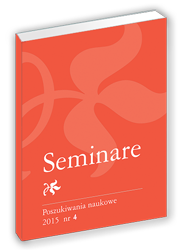Zagadnienie pracy w programach nauki religii w szkołach średnich i zawodowych w latach trzydziestych XX wieku na tle wychowania państwowego
The Concept of Work in Programmes of Religious Education in Secondary and Vocational Schools in the 1930s of the 20th c. Against a Backdrop of the Contemporary Social Education
Author(s): Roman CeglarekSubject(s): Theology and Religion
Published by: Towarzystwo Naukowe Franciszka Salezego (TNFS)
Keywords: Work; secondary school; vocational school; programme; religious education; social education;
Summary/Abstract: Polish pedagogical thought of the interwar period pointed out the importance of forming the citizens’ attitude towards the state.. Cultivation of pro-state attitudes was closely related to the propagation of work ethos. Those educational actions were also undertaken in schools, among others, in the course of religious education. The concept of work was presented in such a way as to show the pupils the value of work, evoke positive attitudes towards their chosen professions, encourage them to work honestly and responsibly, to form a mature personality expressed by the quality of their performed work. All those actions were aimed at strengthening the power and welfare of the state. For that reason, work was perceived in the categories of a patriotic duty. In a way, it was similar to what we call work patriotism in our society these days.
Journal: Seminare. Poszukiwania naukowe
- Issue Year: 36/2015
- Issue No: 4
- Page Range: 41-52
- Page Count: 12
- Language: Polish

